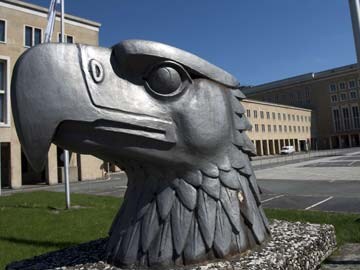
The head of a giant eagle statue, which used to tower over the main terminal of Tempelhof airport is on display in front of the former airport's main entrance in Berlin on April 28, 2014
Berlin:
Voters in the German capital on Sunday rejected plans for a large-scale property development on their former Tempelhof Airport, which has in recent years become a popular inner-city park.
As Berlin citizens cast their ballots for the European parliamentary election, they also voted in a referendum aimed at preserving the green space, which is roughly the size of New York's Central Park.
According to early results, almost 65 percent voted against the development plans proposed by the city-state of Berlin, the local statistics office said.
Tempelhof, measuring 300 hectares (750 acres), sits right in the middle of the German capital of 3.4 million.
The site echoes Berlin's turbulent and troubled history. On its northwestern edge looms the huge semi-circular former airport terminal, typical of the Nazis' architectural gigantism, built between 1936 and 1941.
Early in the Cold War, Tempelhof became the hub for the Berlin Airlift, when Allied planes made some 277,000 landings here to supply the western part of the war-ravaged city with food and fuel during the 1948-49 Soviet blockade.
Opened as a park in 2010, Tempelhof became a temple of outdoor recreation. In summer the open sky is filled with kites, and people run, skate and cycle on the old runways, or simply sunbathe or enjoy a barbecue in the grass.
The city had proposed building some 4,700 apartments, homes and commercial spaces, as well as a large public library, sports fields and a lake, that between them would cover about 20 percent of the field.
A citizens' initiative called "100 per cent Tempelhofer Feld" sprang up in nearby neighbourhoods. They collected more than 185,000 signatures, about 10,000 more than required, to launch Sunday's referendum.
As Berlin citizens cast their ballots for the European parliamentary election, they also voted in a referendum aimed at preserving the green space, which is roughly the size of New York's Central Park.
According to early results, almost 65 percent voted against the development plans proposed by the city-state of Berlin, the local statistics office said.
Tempelhof, measuring 300 hectares (750 acres), sits right in the middle of the German capital of 3.4 million.
The site echoes Berlin's turbulent and troubled history. On its northwestern edge looms the huge semi-circular former airport terminal, typical of the Nazis' architectural gigantism, built between 1936 and 1941.
Early in the Cold War, Tempelhof became the hub for the Berlin Airlift, when Allied planes made some 277,000 landings here to supply the western part of the war-ravaged city with food and fuel during the 1948-49 Soviet blockade.
Opened as a park in 2010, Tempelhof became a temple of outdoor recreation. In summer the open sky is filled with kites, and people run, skate and cycle on the old runways, or simply sunbathe or enjoy a barbecue in the grass.
The city had proposed building some 4,700 apartments, homes and commercial spaces, as well as a large public library, sports fields and a lake, that between them would cover about 20 percent of the field.
A citizens' initiative called "100 per cent Tempelhofer Feld" sprang up in nearby neighbourhoods. They collected more than 185,000 signatures, about 10,000 more than required, to launch Sunday's referendum.

